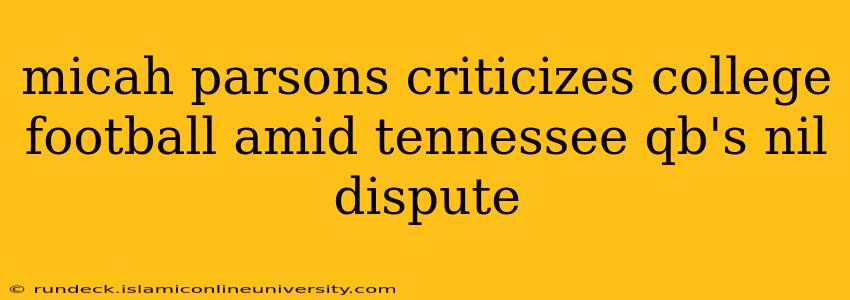Micah Parsons, the star linebacker for the Dallas Cowboys, recently voiced his strong criticism of the current state of college football's Name, Image, and Likeness (NIL) system, specifically referencing the ongoing dispute involving Tennessee quarterback Joe Milton III. This situation highlights the complexities and inconsistencies within the burgeoning NIL landscape, raising crucial questions about fairness, exploitation, and the overall future of college athletics. Parsons' comments serve as a powerful catalyst for a much-needed discussion about the ethical and practical challenges facing college athletes.
What Sparked Micah Parsons' Criticism?
Parsons' criticism stems from the situation surrounding Joe Milton III, who reportedly had an NIL deal terminated after a subpar performance on the field. This incident underscores the precarious nature of NIL deals for college athletes, where their earning potential can be directly tied to their on-field performance, creating a potentially exploitative dynamic. Parsons, having navigated the complexities of the professional sports world, recognizes the inherent pressure and vulnerability of athletes whose livelihood is intertwined with their athletic performance. He argued that this situation demonstrates a fundamental flaw in the current NIL system.
What is the Current State of NIL in College Football?
The NCAA's allowance of NIL deals in 2021 was a landmark decision, granting college athletes the right to profit from their name, image, and likeness. However, the implementation has been far from uniform, leading to a chaotic and often unfair environment. Different states have varying regulations, and the lack of a centralized governing body has resulted in inconsistencies across various schools and conferences.
What are the key challenges in the current NIL system?
-
Lack of regulation: The absence of a cohesive national framework allows for significant discrepancies in NIL rules and enforcement. This creates an uneven playing field for athletes, depending on their school's location and resources.
-
Exploitation concerns: The pressure to perform in order to maintain NIL deals creates a potentially exploitative environment. Athletes may feel pressured to prioritize financial gain over their well-being or academic pursuits.
-
Transparency and disclosure: The lack of transparency around NIL deals raises concerns about the potential for hidden payments and unfair practices.
-
Agent involvement: The involvement of agents and marketing companies raises questions about the protection of athletes' best interests, particularly those from less privileged backgrounds.
How Does Joe Milton III's Situation Reflect Broader Issues?
Joe Milton's case perfectly exemplifies the risks and uncertainties associated with the current NIL system. The termination of his deal, allegedly due to performance, showcases the vulnerability of athletes whose economic stability is tied directly to their athletic success. This raises concerns about the potential for coercion, undue pressure, and a system that could prioritize short-term financial gains over the long-term well-being of the athletes.
How does the Milton situation highlight the need for better regulations?
The Milton situation demonstrates the urgent need for clearer guidelines, stronger oversight, and greater protection for college athletes navigating the complex world of NIL deals. Without substantial reform, the current system risks becoming a tool for exploitation rather than empowerment.
What are the potential solutions for a more equitable NIL system?
To create a truly fair and equitable NIL system, several reforms are necessary:
-
Creation of a national governing body: Establishing a centralized authority would ensure consistency and fairness across all states and institutions.
-
Increased transparency and disclosure: Clear regulations regarding disclosure of NIL deals and their terms would help prevent exploitation and unfair practices.
-
Education and resources for athletes: Providing athletes with the education and resources needed to navigate the complexities of NIL deals is essential to protect their interests.
-
Ethical guidelines and standards: The implementation of ethical guidelines and standards would create a framework for responsible NIL practices.
Micah Parsons’ critique of the current NIL system is a crucial wake-up call for college athletics. His commentary highlights significant concerns about fairness, exploitation, and the overall future of college athletes. Addressing these challenges requires a concerted effort towards creating a more robust, transparent, and athlete-centric NIL system. Only then can the promise of NIL truly benefit college athletes without compromising their well-being.
